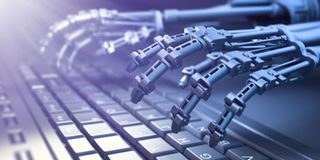Is artificial intelligence a threat to human jobs?

If you could have told anyone from the past centuries that we would be able to communicate in video calls, they would most likely tell you that you are in your fantasy, but years later, with the help of technology, we are able to enjoy a simpler life, having machines do everything for us; calculate for us, wash our clothes, communicate better and much more – a fully automated life.
While technology has evidently improved human lives, the more it keeps advancing, the more it poses a threat to humans – in as far as our jobs are concerned. The concept of Artificial Intelligence termed as ‘AI’, and also known as ‘the fourth industrial revolution’ is now becoming a much more familiar concept, while also raising debates and concerns over its implications towards human jobs.
By definition AI can be described as a branch of computer science that emphasizes the development of intelligence machines, thinking and working like humans, this is mostly in terms of speech recognition, problem-solving, learning and planning. If you think AI is something that we should worry more in the future, you might be right, but these machines are already here and maybe you are already using one of them, from Tesla, to Alexa and even SIRI on your apple gadgets, AI is everywhere.
Where does it come from?
Although it is highly recognizable in the recent years, the concept of AI goes way back to the Second World War where they used an enigma code to send messages and a bombe machine was used to decipher these codes. It is also said that in 1951 a machine known as Ferranti Mark 1 used an algorithm to master checkers. By 1956, American computer scientist John McCarthy organized the Dartmouth Conference, at which he coined the term ‘Artificial Intelligence,’ from there, many researches started to skyrocket.
How AI is replacing humans
Since the rise of AI, there has been a state of uneasiness in the job market, with people fearing for their jobs, owing to the increasing role played by automated machines. People fear that machines will replace them at work. But the CEO of a tech company in Tanzania – SmartCodes, Edwin Bruno doesn’t fully agree with the concept, rather, he says “If we build machines to be smart, we as humans should also be smarter.”
In an interview with Success, Bruno says that the digital era only tries to simplify human work, enabling us to work better since we created the machines.
“In my opinion, AI looks to simplify human work without human interaction. AI can’t take all of our jobs, but we humans should become more creative. Just like how we created AI, we should be creative enough to create new opportunities that will fill the divide created with the coming of AI,” added Bruno.
Despite that, he agrees with the fact that AI can be more reliable and efficient than human effort, hence we do need it, but should be able to fully control it.
His opinion was backed by NALA CEO, Benjamin Fernandes, who said that despite AI’s ability to fully understand customer requests, it doesn’t necessarily mean that it is replacing human jobs, but rather it’s another opportunity to create more jobs.
“I think one of the main replacements would be seen in customer care service agents. A well-trained AI system can understand customer requests in English and Swahili. This translates into faster responses, and optimal efficiency in answering questions. This would save businesses some money on overhead costs. However, that being said, I don’t think we should look at AI as a ‘replacement’ for human jobs, but rather an opportunity to realize there are new types of jobs that are going to be created. I think there will be a stream of new business opportunities empowering entrepreneurship and creativity in the AI space and this is what excites me,” opines Fernandes.
Sophia Abeid, an Electronics and Telecoms Engineer, who’s a Co-Founder of blueprint innovations, says technology helps people to save time and work with more accuracy. “In our case, by using technology we have managed to help orgnaisations monitor and locate documents using a software linked to google maps in real time,” she says.
She adds that misplacing and losing of important files, which can be caused by human errors, will not be an issue thanks to the help of tech.
How should humans prepare to deal with the rise of AI?
It is no doubt that AI is on the rise, but it is also undoubtedly both a threat and an opportunity. Is there hope for a co-existence environment? That’s up to humans to decide. Nevertheless, with all the back and forth with the technology, how can humans prepare for the rise of AI? SmartCodes’ Bruno suggests that we should look beyond the creation of AI to seize opportunities that come with it.
“We should look forward to what is next after creating AI. We need to be more innovative in order to be successful in creation of more jobs, we should be inventive,” he said.
Fernandes added that people shouldn’t be scared but should work on better understanding how to co-exist and work together with AI, the productivity levels would increase.
“I think those in emerging markets should pay more attention. Not to be scared but to be aware, understand and know how AI can support the work we all do. I think there is a fine line between the inter-sections of what we believe should be controlled by technology vs human decisions,” says Fernandes.
Whether AI will steal all our jobs in the future or not still remains to be answered, but what is necessary is to allow technology advancement to happen, while at the same time learn how to control technology so that it can work for us and not against us.




